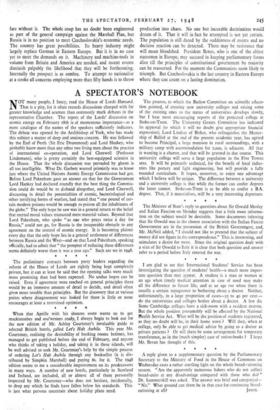A SPECTATOR 'S NOTEBOOK N OT many people, I fancy, read
the House of Lords Hansard. That is a pity, for it often records discussions charged with far greater knowledge and acumen than commonly mark debates in the representative Chamber. The report of the Lords' discussion on atomic energy on February 18th is of momentous importance—as a mere catalogue of the names of the speakers sufficiently indicates. The debate was opened by the Archbishop of York, who has made this subject a matter of deep and anxious concern. He was followed by the Earl of Perth (Sir Eric Drummond) and Lord Hankey, who probably know more than any other two living men about the practice of international co-operation, and Lord Cherwell (Professor Lindemann), who is pretty certainly the best-equipped scientist in the House. That the whole discussion was pervaded by gloom is all too intelligible. What Dr. Garbett wanted primarily was to know just where the United Nations Atomic Energy Commission had got. Before Lord Pakenham gave an answer on that for the Government Lord Hankey had declared roundly that the best thing the Commis- sion could do would be to disband altogether, and Lord Cherwell, discussing in detail the potentialities of atomic, bacteriological and other terrifying forms of warfare, had stated that "one pound of cer- tain thodern poisons would be enough to poison all the inhabitants of the globe." The only hope he saw was in a general return to the belief that eternal moral values transcend mere material values. Beyond that Lord Pakenham, who spoke " as one who prays twice a day for Russia," could not go, for Russia is the insuperable obstacle to any agreement on the control of atomic energy. It is becoming plainer every day that the only hope lies in a general settlement of differences between Russia and the West—and on that Lord Pakenham, speaking officially, had to admit that " the prospect of reducing these differences seems definitely worse than it was a year ago." Such are we in 1948.
* * * *


































 Previous page
Previous page